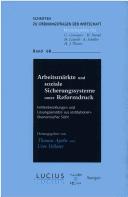| Listing 1 - 10 of 10 |
Sort by
|
Digital
Abstract | Keywords | Export | Availability | Bookmark
 Loading...
Loading...Choose an application
- Reference Manager
- EndNote
- RefWorks (Direct export to RefWorks)
Digital
Abstract | Keywords | Export | Availability | Bookmark
 Loading...
Loading...Choose an application
- Reference Manager
- EndNote
- RefWorks (Direct export to RefWorks)
Digital
Abstract | Keywords | Export | Availability | Bookmark
 Loading...
Loading...Choose an application
- Reference Manager
- EndNote
- RefWorks (Direct export to RefWorks)
Digital
Abstract | Keywords | Export | Availability | Bookmark
 Loading...
Loading...Choose an application
- Reference Manager
- EndNote
- RefWorks (Direct export to RefWorks)
Book
ISBN: 1462302556 1452762368 1281345466 9786613779038 1451896697 Year: 1999 Publisher: Washington, D.C. : International Monetary Fund,
Abstract | Keywords | Export | Availability | Bookmark
 Loading...
Loading...Choose an application
- Reference Manager
- EndNote
- RefWorks (Direct export to RefWorks)
EMU started with eleven member countries as scheduled on January 1, 1999. The paper shows that the primacy of politics over economics in this decision could have serious consequences concerning the stability of EMU in the transition phase. Speculative attacks against currencies which are in economic distress due to asymmetric shocks can still happen. A speculative attack as such cannot force a country out of EMU. However, the country concerned might voluntarily decide to leave the system as the costs of staying inside EMU, e.g., due to further rising unemployment, become too large to bear.
Labor --- Public Finance --- Wages, Compensation, and Labor Costs: General --- Unemployment: Models, Duration, Incidence, and Job Search --- Fiscal Policy --- Labor Economics Policies --- Employment --- Unemployment --- Wages --- Intergenerational Income Distribution --- Aggregate Human Capital --- Aggregate Labor Productivity --- Comparative or Joint Analysis of Fiscal and Monetary Policy --- Stabilization --- Treasury Policy --- Fiscal Policies and Behavior of Economic Agents: General --- Labour --- income economics --- Macroeconomics --- Real wages --- Fiscal policy --- Labor market reforms --- Manpower policy --- United States --- Income economics
Digital
Abstract | Keywords | Export | Availability | Bookmark
 Loading...
Loading...Choose an application
- Reference Manager
- EndNote
- RefWorks (Direct export to RefWorks)
Digital
Abstract | Keywords | Export | Availability | Bookmark
 Loading...
Loading...Choose an application
- Reference Manager
- EndNote
- RefWorks (Direct export to RefWorks)

ISBN: 3110499487 311050880X 3828202047 Year: 2016 Publisher: De Gruyter
Abstract | Keywords | Export | Availability | Bookmark
 Loading...
Loading...Choose an application
- Reference Manager
- EndNote
- RefWorks (Direct export to RefWorks)
Digital

ISBN: 9783110508802 9783828202047 Year: 2016 Publisher: München ;; Wien De Gruyter Oldenbourg
Abstract | Keywords | Export | Availability | Bookmark
 Loading...
Loading...Choose an application
- Reference Manager
- EndNote
- RefWorks (Direct export to RefWorks)
Digital

ISBN: 9783110505344 9783828200388 Year: 2016 Publisher: München ;; Wien De Gruyter Oldenbourg
Abstract | Keywords | Export | Availability | Bookmark
 Loading...
Loading...Choose an application
- Reference Manager
- EndNote
- RefWorks (Direct export to RefWorks)
| Listing 1 - 10 of 10 |
Sort by
|

 Search
Search Feedback
Feedback About UniCat
About UniCat  Help
Help News
News